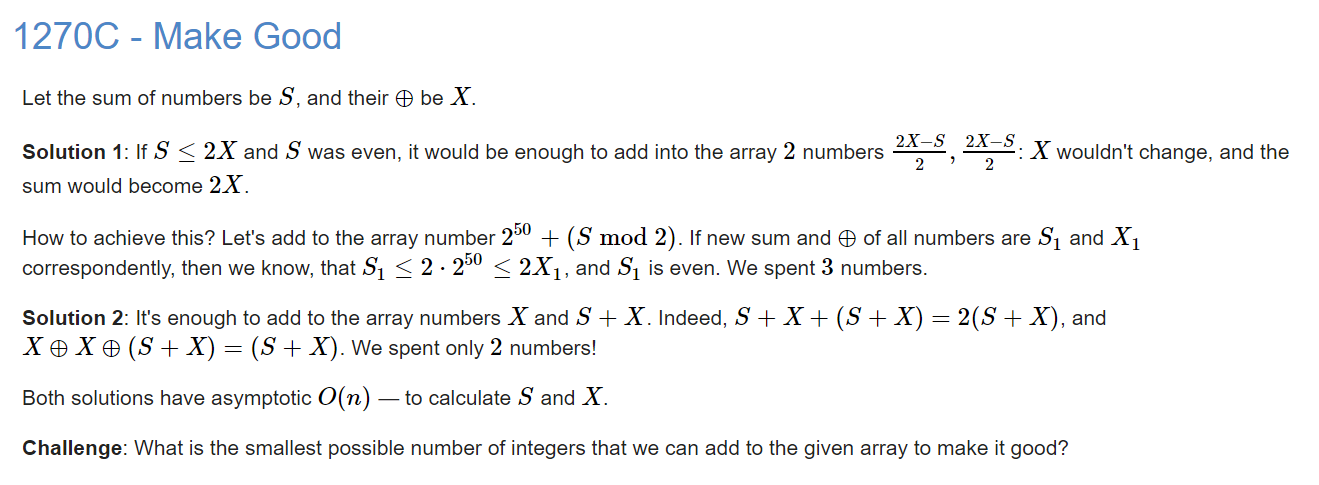Codeforces 1270C 思维题
Let's call an array a1,a2,…,ama1,a2,…,am of nonnegative integer numbers good if a1+a2+⋯+am=2⋅(a1⊕a2⊕⋯⊕am)a1+a2+⋯+am=2⋅(a1⊕a2⊕⋯⊕am), where ⊕⊕denotes the bitwise XOR operation.
For example, array [1,2,3,6][1,2,3,6] is good, as 1+2+3+6=12=2⋅6=2⋅(1⊕2⊕3⊕6)1+2+3+6=12=2⋅6=2⋅(1⊕2⊕3⊕6). At the same time, array [1,2,1,3][1,2,1,3] isn't good, as 1+2+1+3=7≠2⋅1=2⋅(1⊕2⊕1⊕3)1+2+1+3=7≠2⋅1=2⋅(1⊕2⊕1⊕3).
You are given an array of length nn: a1,a2,…,ana1,a2,…,an. Append at most 33 elements to it to make it good. Appended elements don't have to be different. It can be shown that the solution always exists under the given constraints. If there are different solutions, you are allowed to output any of them. Note that you don't have to minimize the number of added elements!. So, if an array is good already you are allowed to not append elements.
Each test contains multiple test cases. The first line contains the number of test cases tt (1≤t≤100001≤t≤10000). The description of the test cases follows.
The first line of each test case contains a single integer nn (1≤n≤105)(1≤n≤105) — the size of the array.
The second line of each test case contains nn integers a1,a2,…,ana1,a2,…,an (0≤ai≤1090≤ai≤109) — the elements of the array.
It is guaranteed that the sum of nn over all test cases does not exceed 105105.
For each test case, output two lines.
In the first line, output a single integer ss (0≤s≤30≤s≤3) — the number of elements you want to append.
In the second line, output ss integers b1,…,bsb1,…,bs (0≤bi≤10180≤bi≤1018) — the elements you want to append to the array.
If there are different solutions, you are allowed to output any of them.
3 4 1 2 3 6 1 8 2 1 1
0 2 4 4 3 2 6 2
In the first test case of the example, the sum of all numbers is 1212, and their ⊕⊕ is 66, so the condition is already satisfied.
In the second test case of the example, after adding 4,44,4, the array becomes [8,4,4][8,4,4]. The sum of numbers in it is 1616, ⊕⊕ of numbers in it is

#include<iostream> #include<cstdio> using namespace std; int n; long long ans[5]; int main(){ int t; scanf("%d",&t); while(t--){ scanf("%d",&n); long long sum=0,a=0; int cnt=0,x; for(int i=1;i<=n;i++){ scanf("%d",&x); sum+=x; a^=x; } ans[++cnt]=(1LL<<50)+(sum%2); sum+=ans[cnt]; a^=ans[cnt]; ans[++cnt]=(2LL*a-sum)/2; ans[++cnt]=(2LL*a-sum)/2; printf("%d\n",cnt); for(int i=1;i<=cnt;i++)printf("%lld ",ans[i]); puts(""); } return 0; }


【推荐】国内首个AI IDE,深度理解中文开发场景,立即下载体验Trae
【推荐】编程新体验,更懂你的AI,立即体验豆包MarsCode编程助手
【推荐】抖音旗下AI助手豆包,你的智能百科全书,全免费不限次数
【推荐】轻量又高性能的 SSH 工具 IShell:AI 加持,快人一步